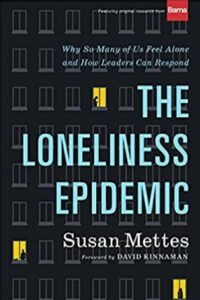The Loneliness Epidemic by Susan Mettes
 A 2015 BYU study showed that loneliness and social isolation actually shorten your life—as much as smoking 15 cigarettes a day. Relationships (or the lack thereof) affect our physical health!
A 2015 BYU study showed that loneliness and social isolation actually shorten your life—as much as smoking 15 cigarettes a day. Relationships (or the lack thereof) affect our physical health!
When the COVID pandemic hit, we were arguably more isolated than we’d ever been.
Susan Mettes’s book, The Loneliness Epidemic, was published in 2021 and addresses loneliness with data from both sides of the pandemic—one survey from Feb 18-Mar 4, 2020 and another from Apr 28-May 11, 2020.
Mettes defines loneliness as ‘the distress someone feels when their social connections don’t meet their needs for emotional intimacy. So it’s a lack.’ [1]
We are designed for intimacy and belonging. A network of trusting, satisfying friendships is essential to human flourishing. But intimacy in America is weak, which was only emphasized in the pandemic, and so the need for connection often goes unmet. The result is loneliness.
Loneliness is different than social isolation, though there is overlap between the two (and it’s not as strong as you might expect). There are two kinds of loneliness. First, ‘social’ loneliness wants company, and almost anyone will do. Second, ‘emotional’ loneliness is the lack of a special relationship, like when we lose a spouse. Extroverts need more ‘company’ than introverts, but both need ‘special relationships.’
Mettes explores and helps undo our stereotypes around loneliness, especially around the categories of age, romance, insecurity, social media, faith, and privacy. For example, many assume that older adults are the loneliest, but actually young adults are the loneliest age group.
The solution that Mettes unpacks combines belonging, closeness, and expectations. Loneliness functions as a ‘relationship gauge.’ When loneliness begins to bubble to the surface, it’s time to intentionally pursue relationships.
Mettes writes, ‘If belongingness is the near opposite of loneliness, friendship is often the most powerfully anti-loneliness form of belonging.’ [2]
Closeness—another aspect of protecting against loneliness—includes hospitality, physical touch, and neighborliness. These are most likely to happen if we initiate them. If we wait for others to initiate, unmet expectations may only exacerbate loneliness.
We can build intimacy by pursuing thick conversations instead of thin conversations, by listening with curiosity, and by asking meaningful questions.
The church, Mettes suggests, provides solutions to loneliness that may be prescribed by doctors, including group singing, community service, in-person meetings, confidential relationships, and people you can call in an emergency.
But she also pushes us towards hospitality:
‘There are gaps in our Christian lives that demonstrate an inability to transform loneliness into belonging. For example, almost a third of Christian households barely, if ever, practice hospitality. Only 60 percent have guests in their homes once a month, and only 39 percent have guests who aren’t family members. In an intimacy-starved society, shouldn’t Christians be open enough to have people over every now and then?’ [3]
[1] Mettes, 23.
[2] Mettes, 120.
[3] Mettes, 14–15.
